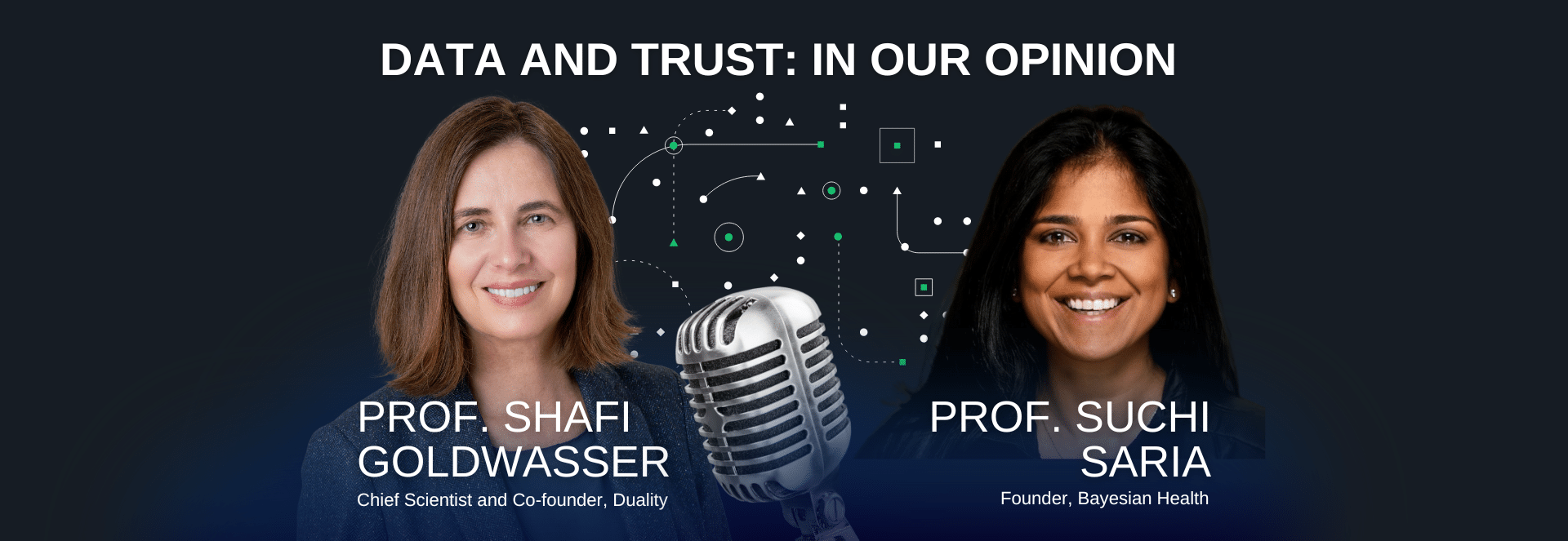Over the past decade, I have had the honor of being an advisor, speaker, and liaison with leading healthcare organizations. The subject of data and its uses is well recognized as the fuel of digital transformation in healthcare. Moreover, the need to collaborate on data in order to derive the required insights and value is increasingly understood by the healthcare ecosystem: providers, insurers, payers, researchers and vendors. One of the major barriers to these crucial and necessary collaborations, is the sensitivity of health data – it’s regulated and extremely valuable to the organizations that painstakingly generate and curate it. Luckily new Privacy Enhancing Technologies (aka PETs) are now ready for production deployments and can finally help in removing the obstacles preventing data collaborations even on very sensitive data.
One of the most promising uses of health data is to train a variety of Machine Learning models and to use these models for zillions of applications, such as early detection of critical conditions, disease risk, decision support in a variety of diagnoses, drug discovery, and many more.
Bayesian Health is a great recent example of a mission-driven company. Bayesian is on a mission to save patients lives by applying machine learning for early detection of life threatening conditions like sepsis. Duality’s Chief Scientist and Co-founder, a Turing award winner, Prof. Shafi Goldwasser, has sat down to interview Prof. Suchi Saria, the founder of Bayesian Health and a member of Duality’s advisory board, on the growing roles of ML, AI and data collaboration in healthcare.
Saria explained that while she had been researching Computer Science for over 20 years, she only ventured into healthcare in 2007 – before the mass digitization of personal health information (PHI). At the time, she said, health data was messy and largely not available digitally – which quickly began to change around the time she joined the field.
Once digitized, healthcare professionals did not fully know or understand how to leverage their new data resources. The reality is that healthcare data is the critical ingredient to making life-saving decisions, both for personal and public health.
In 2018, Saria started Bayesian – a health technology company now bringing state of the art healthcare statistics techniques to fruition. Among other missions, Bayesian is dedicated to using data and ML to help providers anticipate patients at risk for declining trajectories, provide real time care – and help identify and prevent health crises from originating or spreading.
Where Machine Learning and Healthcare Meet
Saria’s latest work includes a published study in Nature Medicine proving the first instances of ML/AI deployed at bedside – showing the potential to use predictive tools to save lives. The system Bayesian built pulls data in real time, surveilling and analyzing data that shows risk for complications like sepsis.
Sepsis is a critical sample condition for this use case – since sepsis is often easy to treat with early detection, but difficult to detect early enough.
With Bayeasian’s revolutionary system, the provider looks at the analysis provided by the AI and sees if they agree – and if so, treatment is initiated. The results include a significant decline in mortality rates in patients with sepsis.
Preventative and palliative medicine also benefits. Another example examines AI/ML in the context of Parkinson’s disease treatment and progression. Parkinson’s, like other degenerative neurological diseases, can be difficult to measure in terms of progression. Currently, patients go to the doctor once every 9 months and are given questionnaires with questions such as “How are you feeling?”, “How much tremor are you experiencing?”, etc. Much of this data can actually be automated by using surrogate markers; wherein a phone or wearable device can measure degree of movement and reaction time to objectively track the progression of the disease.
Success Benchmarks and Barriers for Machine Learning in Healthcare
Implementing ML in healthcare institutions nationally and internationally may seem like a no-brainer solution – but reality is far more complex.
First, data scientists and healthcare professionals alike must define success benchmarks for new technologies in this space; Saria and Goldwasser surfaced issues such as the ability to leverage many different types of data securely across multiple data silos. Once the data can be leveraged effectively, it must then be used in an environment where trust can be enforced between all participating parties.
The secondary issue is overcoming obstacles to adoption. The primary obstacle is no longer whether high-quality tools and mechanisms exist; it is overcoming intra-industry hesitation to adopt the digital transformation in general – let alone integrate advanced AI into sensitive systems, to handle data that can literally save or destroy lives. Until 4 years ago, very few healthcare providers in the US even stored data on the cloud for that reason, despite the cloud movement becoming widespread between 2006-7; this, despite evidence post-cloud migration that managing health data on the cloud is far easier and safer than managing it on-premise.
With the onslaught of the COVID-19 pandemic, the importance of fully leveraging digital health data and tools became more important than ever. Forward-thinking healthcare technologists were able to monitor COVID patients with these types of technology and forecast which patients were at the most risk. This introduced a secondary obstacle, however: adopting the ability to put these analytics back into the workflow to start informing real time decisions. Most healthcare infrastructure is too old to support the advanced analytics to produce real-time data for these workflows; a full-fledged digital transformation in the healthcare industry would have to take into account scalability and adaptability.
The Duality Platform: The Forefront of Digital Transformation in Healthcare
The Duality Platform helps accelerate the widespread adoption of AI/ML in healthcare by providing solutions which allow multiple data centers to collaborate privately, securely, and compliantly. To do so, participating healthcare institutions need only decide on the data to utilize and which set of computations needed to run. Then, Duality’s expert data science teams introduce a collaboration hub which uses advanced privacy enhancing technologies including federated analytics and learning and cryptographic tools which allow computation on the data without exposing it. The platform is customizable to fit the specific requirements of individual use cases.
Looking Ahead
Overall, Saria asks, can the public place their trust in advanced algorithms?
The answer is yes – but only after the public becomes more aware and educated about how models can read data objectively and help healthcare providers make critical decisions. The public should also be educated about how technology is extensively and rigorously validated to help blend human ingenuity with machine-driven decision making.
Once the digital transformation of healthcare is complete – and if done well – Saria hopes to see a significant reduction in mortality rates as well as in healthcare costs. And it’s within reach within as little as 10 years – driven by the innovative technology providers, with the deep expertise of statistics, machine learning and data privacy to optimize patient care.















